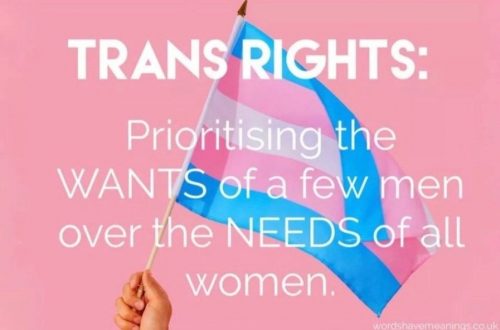I’ve noticed many interesting posts and stories this week which tap into debates around the relationship between feminism and freedom.
If you haven’t already done so, do read Unrepentant Jacobin’s eloquent argument for banning full face coverings – I still don’t agree with his perspective, but it certainly reminded me why it’s an issue which has made me waver in the past.
Prepare to have your blood pressure raised by the infuriating comments made by Vivienne Westwood in response to Jemima’s Khan’s defection from the Assange cult.
I believe that misapplied feminism is holding Julian in legal limbo, women living in the privileged world who blindly support feminism, not seeing the wood for the trees
There are all sorts of debates to be had within feminism, but ‘not seeing the wood for the trees’ implies that it is a superfluous luxury, something to be indulged in only as long as it doesn’t get in the way of the really important stuff – like protecting Julian Assange. Now he may or may not be guilty of the crimes he has been accused of, but he has certainly done plenty which should give his groupies pause for thought. I agree with Katy Brand’s conclusion here:
I would say it is Dame Vivienne herself who lives in a privileged world and perhaps it is her support for Assange that is blind.
Not surprisingly, Assange’s name crops up in Julie Bindel’s recent piece on the left’s betrayal of feminism. She asserts:
When women work with leftist men to achieve a common aim, any issues specific to women are often seen as a “bourgeois deviation” and counter to the wider cause.
Well – that might be true if you spend too much time hanging out on Socialist Unity or in the SWP, but seems unfair if applied to ‘leftist men’ more generally. I don’t agree with her claim that, due to the two men’s different positions on the political spectrum, David Cameron’s patronising remarks to Angela Eagle (‘Calm down, dear’) attracted more criticism than those addressed by Austin Mitchell to Louise Mensch. Cameron is a more prominent politician than Mitchell and his comments were made in the House of Commons, not on Twitter. And Mitchell did in fact attract a fair bit of criticism. Also – it’s a strange stretch to describe Brendan Neill as any kind of leftist, even though I agree that his comments about feminist opposition to pornography are – and are designed to be – provocative and insulting:
Brendan O’Neill, an extreme libertarian formerly associated with the Revolutionary Communist Party and its magazine Living Marxism, is one of many men on the Left who defends pornography despite a long battle by feminists to show how it degrades women. In a recent article, “A Marxist defence of Page 3 girls”, on the LeftCentre website O’Neill quoted Marx on press freedom before wading into the feminists who gave evidence to the Leveson inquiry about sexist media representation of women. O’Neill called them a “bevy of feminists”, “a shrill chorus”, and “boob blockers”.
But not all defences of pornography need be couched in deliberately sexist terms. Here is Steve Hynd arguing in favour of pornography from a – or from one – feminist perspective:
What we cannot afford to do, is make the porn industry a punch bag. We need to welcome the progressives within it and openly criticise the bigots, rapists, traffickers, heroin dealers and misogynists.
…
[W]e have to articulate that these values and actions have no place in a civilised society. At the same time we need to be saying that all people regardless of their gender or sexuality are empowered to articulate their desires in a non-judgmental environment.
Please note the warning at the top of his post. On the same topic, Iceland is considering legislation to prevent all online access to pornography.
Although I don’t want to comment directly on Lord Rennard, I liked Ophelia Benson’s withering dismissal of Rod Liddle here. And here are some further observations, which have a wider relevance than the Rennard case, on women’s experience and perception of sexual harassment.
Here’s a very good post from Quilliam, reporting on an FGM conference organized by the Iranian and Kurdish Women’s Rights Organization:
Fadela Novak of the United Nations High Commissioner for Refugees (UNHCR) gave a statistical overview of FGM and female asylum seekers in the EU. She provided an array of data on the topic, some of which is listed in the second paragraph. However, the most striking part of her lecture was not the statistical data, but rather an anecdote about a woman seeking asylum in Belgium who had experienced FGM. This woman began telling her assigned social worker that she had experienced FGM prior to her arrival to Belgium. Her social worker stopped her and told her that she didn’t know what female genital mutilation was. The anecdote continued on with the FGM victim expressing her frustration and dismay that the person sent to help her did not even know about the widespread injustice that she, along millions of other women like her, have suffered. This account perhaps encapsulates the message put forth at the during Quilliam’s time at the conference: that FGM is an often ignored or unknown problem that must be acknowledged, explained, and confronted.
Finally – one rather tense debate within feminism centres around the relationship between feminism and male victims of domestic violence and sexual abuse, so I’ll conclude with a link to a strong piece by James Hallwood over on Left Foot Forward about male victims of rape during war.
Hat tips: amie and Usama Hasan


